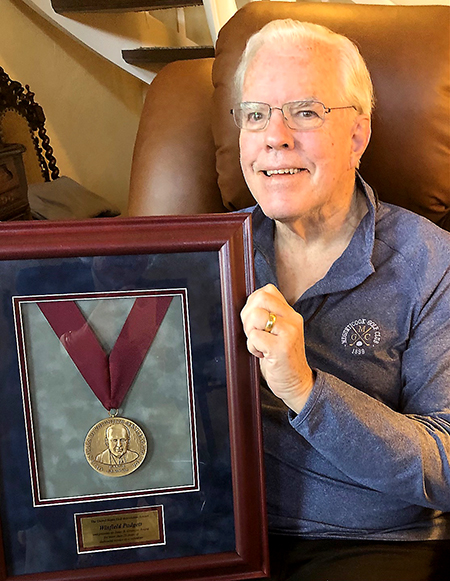
Win Padgett Jr. holding the USGA’s Issac B. Grainger Award, which recognizes 25 years of service to the Association.
Win Padgett Jr. passed away on March 6, 2024. He was one of the original co-founders of the Society of Hickory Golfers, a gentleman and a strong influence on the early growth of modern hickory golf. Win was 78 and had been in poor health for several years.
“Win loved hickory golf and was a giant for the hickory game’s 1990s resurrection,” said friend and fellow co-founder John Crow Miller. “I am sure Ralph Livingston is already talking Win’s ear off….”
Livingston, who passed away in August 2012, was another of the Society’s co-founders and well known for the strength of his opinions and the volubility with which he offered them.
The following account of Mr. Padgett’s life was posted on this website on Feb. 5, 2021.
By William Reed
Win Padgett of Dallas, Texas, recently telephoned close friend Curt Sampson and asked for assistance in helping to divest his decades long collection of golf memorabilia, clubs, trophies, books, and keepsakes that had taken over his home. Win, who is battling some health issues, explained that it was time to downsize.
Sampson, who was the GHS keynote speaker at its 2014 annual meeting inLas Vegas, is the writer and author of 18 books, countless golf publication articles, a previous professional golfer, member of the Golf Heritage Society, the Society of Hickory Golfers, a great playing partner with hickories and generally an all-around good guy.
While Win is a true Texas native, Sampson, is not, but is now a resident and does his writing at his small ranch in Ennis, the former home of the late Texas golfing legend Johnny Henry.
After telling Win he would be happy to help, Curt recruited me to assist. I met Win decades ago, but we were not especially close, mainly because we lived so far apart. Nonetheless, I told Curt I’d be happy to assist. My official residence is still in Iowa, although I do winter in Texas, and enjoy not fighting the snow, ice, and blizzards that seem to hit Iowa much more than Dallas. I also wanted to re-kindle my association with Win.
Not wasting a moment, Curt hauled to my Dallas suburb residence a number of keepsakes that had been in Win’s office; multiple cardboard boxes that needed to be itemized, appraised, inventoried, and priced to the appropriate venue for liquidation. Some would be auction items, some would be offered on trade tables at hickory events, some on eBay, and some at flea markets or garage sales. I hadn’t even gotten to the golf clubs yet.
As I went through item after item that had been in Win’s office, I couldn’t help but think of the many similar “no market value” items that I had kept over the years. You know what these are – the numerous small things that mean a lot to the owner, but wouldn’t bring a nickel on a quarter table in a garage sale. Win had the same things.
As is often the case, though, such innocuous items might be next to something of greater value. That small ash tray sat next to a thousand dollar sterling silver trophy from a turn-of-the-century golf championship in the U.K. A modern Pinnacle logo ball from a charity 4-person scramble (no value) might sit next to an original Haskell patented in 1898 (almost name your price). Such is the nature of golf collecting.
I asked Curt to arrange “a coffee date with you, me, and Win…I want to know my Texas long lost twin.” Curt arranged that coffee klatch in short order and we met to re-acquaint ourselves. Curt had an additional appointment after a little over an hour, but Win and I visited for another two hours talking on a wide range of things and I got to know him better.
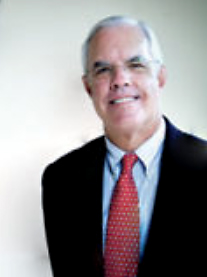
Win Padgett
H. Winfield Padgett Jr. was born on April 26, 1945. His father, Hal, was the second generation proprietor of the Padgett Printing Company started by Win’s grandfather, Cyrus Padgett, c. 1903. The Padgett Printing Company was liquidated in 2012.
Win’s father, an excellent amateur golfer, was a member at the Brook Hollow Country Club in Dallas. He taught Win Jr. the game when the youngster was around 10 or 11 years old. The son continues the membership legacy at Brook Hollow to this day, while having been a board member five times and serving as the club president in 2011. Brook Hollow is a 1920 Tillinghast design. Classic, and yes, very exclusive.
Win learned of the Golf Heritage Society (then named the Golf Collectors Society) about 1986 at a time when Johnny Henry was serving as golf course superintendent of Brook Hollow. Win became one of perhaps hundreds of GCS members brought on board by Johnny Henry. It didn’t hurt that John Crow Miller also frequented Brook Hollow. A few years later, in 2000, Padgett and Miller joined six other gentlemen to form the Society of Hickory Golfers. Miller handled the legal processing and the roots of the SoHG are a part of Texas history.
H. Winfield Padgett Jr. has also made his mark at the highest levels of golf in this country, serving with the USGA. He has served on the museum and archives committee since 1986, was a member of the executive committee in 1998, and served as the treasurer in the years of 2002-06.
His wife, Nancy, is as proud of Win’s golf accomplishments as she is of the many other facets of their life together. They met in 1973 at Love Field as they were both licensed pilots. Get it…Love Field…they were married in 1975.
I asked Win about championships at Brook Hollow and other places as there are several trophies around the house with his name on them. He smiled faintly and said he won the Brook Hollow Junior Championship in 1961. He didn’t volunteer any other accolades, but one gets the feeling that he is proud to have done well as a player. I had the temerity to inquire about the lowest handicap he had achieved and received an almost embarrassed answer, “2.”
Though naturally modest and sometimes reticence to talk about certain things, Win was pleased I asked about his health issues. He said he has contracted Parkinson’s Disease and didn’t want to shy away from the subject. He felt that public awareness could aid in funding for a possible cure.
Roger Hill, of Grand Rapids, Mich., is another Padgett friend of many years and one of the co-founders of the SoHG. Hill, a past president of the GCS, recalled a story about the Hickory Grail, a British Golf Collectors Society fixture on which the two were teammates.
“The Brits would ask this same question over and over whenever they would meet a new ‘Yank,’” Hill said. “Is he a gentleman?”
In the case of Win Padgett, Roger said, the answer hardly needed asking. Roger also said Win is a great one to compare yourself to when trying to answer that question about yourself.
You may be wondering why I have not offered further descriptions of items in the Padgett Collection, but the important thing is the man, not what the man has accumulated. If you do want to learn more about the Padgett Collection, contact Curt Sampson or William Reed. I’m just glad that I could visit when I did.
Now who wants to spend a nickel from the quarter table or the $1,000 sterling silver cup? How about a logo ball for 50 cents or a gutty bramble for $350?
Take a number, get in line, no elbowing, no crowding, be courteous, be a gentleman. Be Win Padgett.
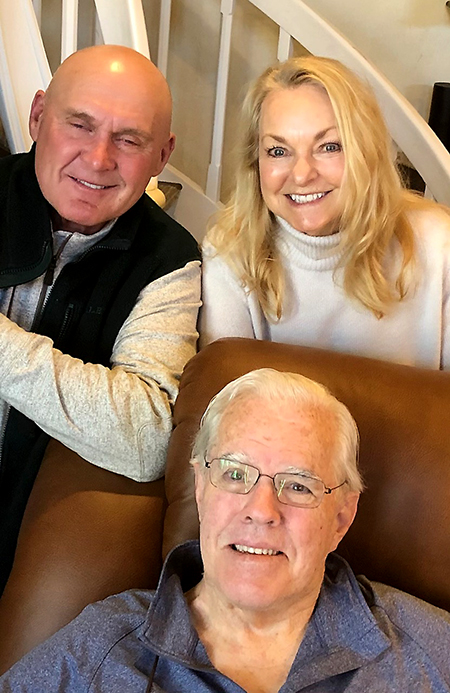
Win Padgett with wife, Nancy, and long time friend Curt Sampson.
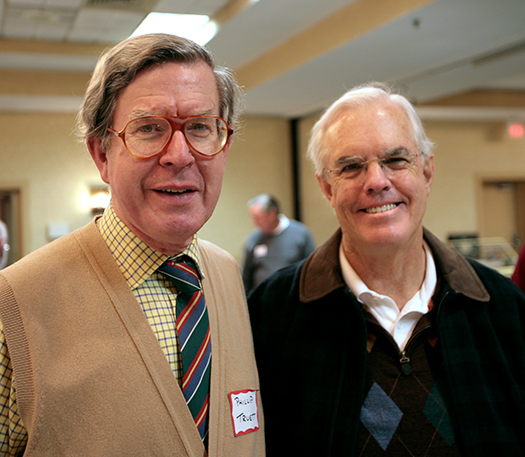
Win at the 2009 Dayton trade show with Philip Truett, a British golf collector and past president of the British Golf Collectors Society.
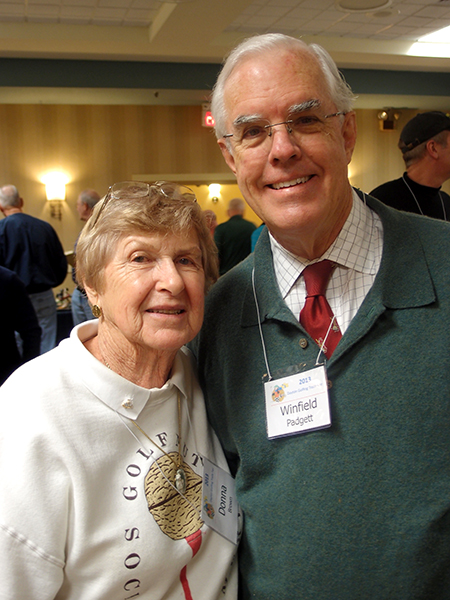
Win at the 2010 Dayton trade show with Donna Hamilton Brown.
